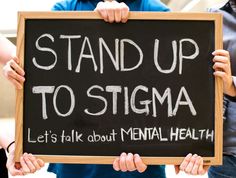STIGMA AND MENTAL ILLNESS, OPENING YOUR MIND!
 All over the world, we can still encounter a certain degree of mental illness stigmatisation that can hardly be described as something positive, be it in its milder or more severe form(s). Nevertheless, it still represents a tag that put someone in various negative frameworks typical for stigmatised persons. According to these contexts, people still presume that persons experiencing mental health problems are mad, dangerous, unpredictable, with lesser working abilities, incapable of work, thus belonging to various forms of institutional care, etc.
All over the world, we can still encounter a certain degree of mental illness stigmatisation that can hardly be described as something positive, be it in its milder or more severe form(s). Nevertheless, it still represents a tag that put someone in various negative frameworks typical for stigmatised persons. According to these contexts, people still presume that persons experiencing mental health problems are mad, dangerous, unpredictable, with lesser working abilities, incapable of work, thus belonging to various forms of institutional care, etc.
Hence, it very often happens that other people frequently look down on person with mental health troubles, establishing some sort of patronising attitude thus supposing these persons are either incapable or unable to take care for themselves. Nevertheless, they are also being stigmatised by hiding away from society or by not telling others that their relative has got some mental issues.
Still, in any possible cases the stigmatisation of people with mental health problems can trace its origins right down to the very beginnings of the existence of our society. People, in general, are afraid of anything that is different and, in most cases, they render it as unacceptable. Therefore, it could arguably be assumed that in the last years the phenomenon of stigmatisation even appears to be growing but it has moved to more hidden, obscure levels.
Stigmatisation is thus being fought by different individuals, institutions and companies trying to educate people, open their eyes, hearts and minds. This can be done in many ways, through different kinds of education and training, presentations and promotions of various programmes, raising awareness of people by the help of many projects etc. At the same time, stigmatisation is being fought by people with mental troubles themselves establishing all kinds of associations, movements that try to raise awareness of their own rights and their acceptance.
In sum – how and what can we do to open people's eyes, hearts and minds? Protests and similar outcries for equality does not seem to achieve much because people do not seem to react any longer to such action. Even by drafting legal suggestion, seeking for scientific proof, etc. doesn't appear to have much effect, at least not at the scale we would have desired. Therefore, the most effective way we can change and open people's hearts, mind and perspectives seem to be carried by personal stories. Individual stories appear to have the unique power to instantly change people’s beliefs and thoughts they have cherished whole their life.
Photo taken from Pinterest





